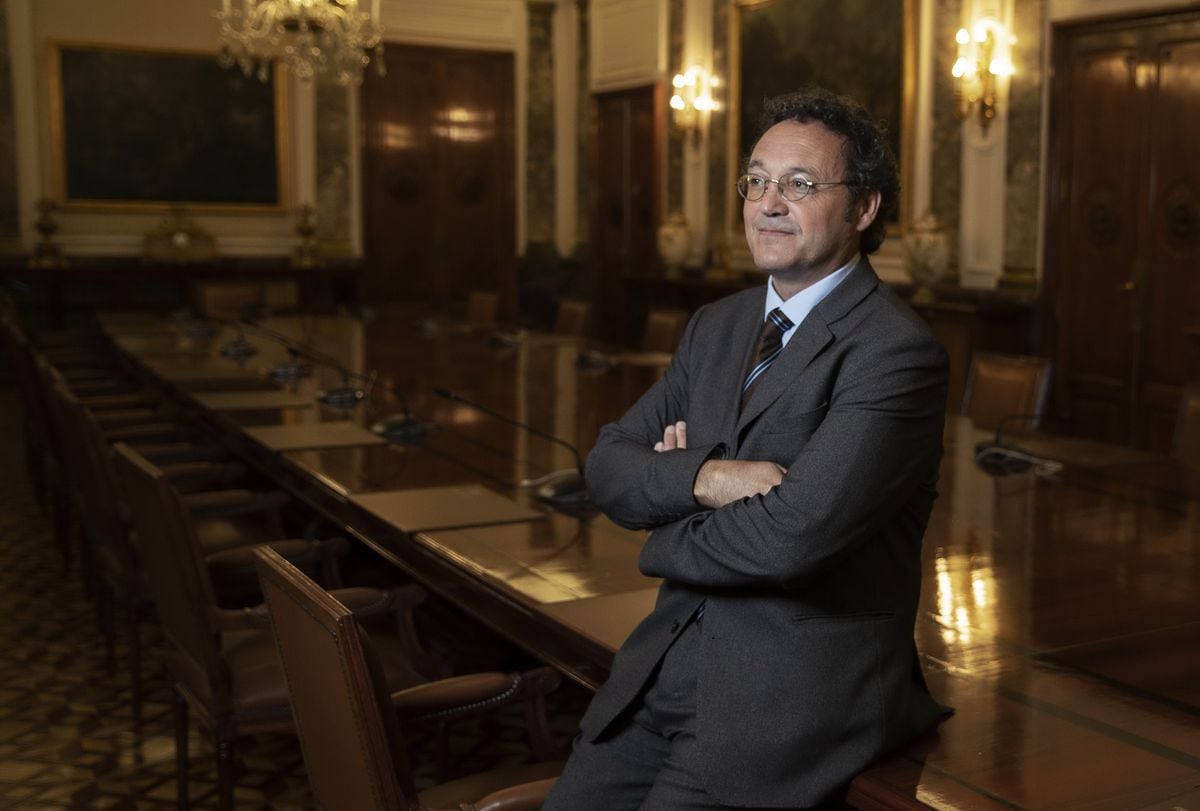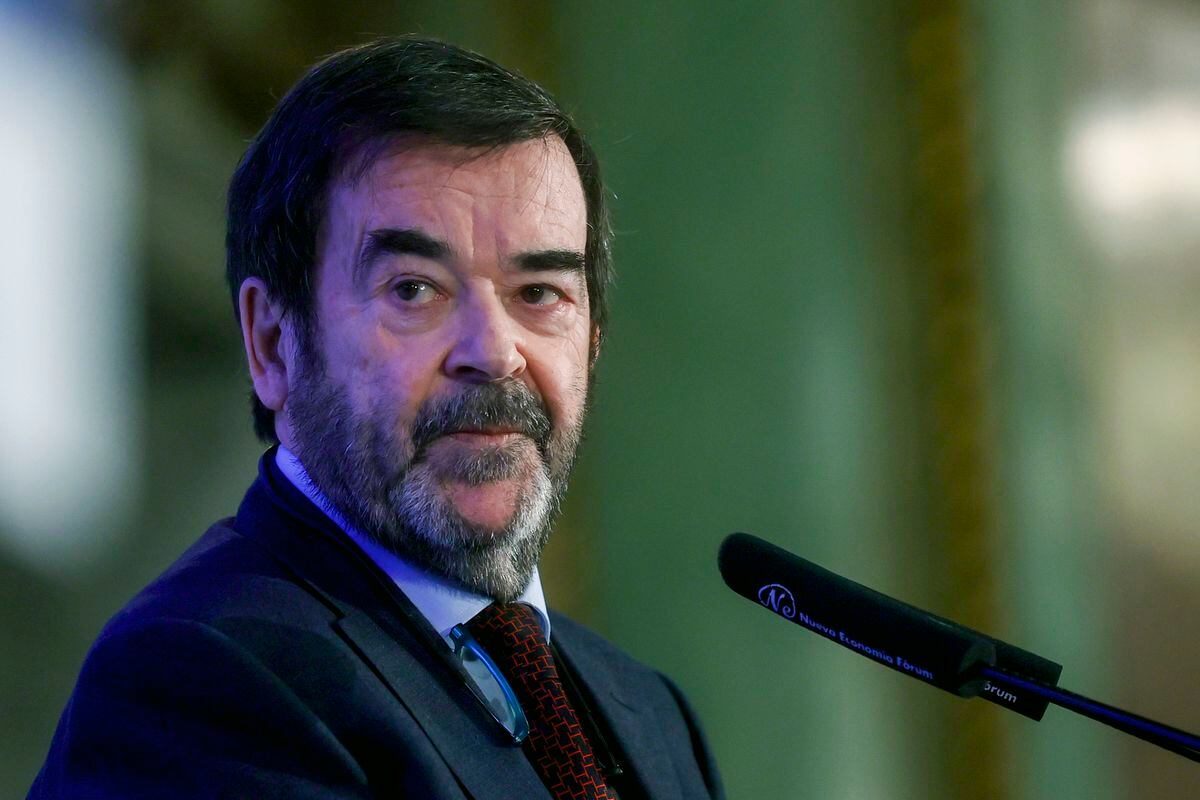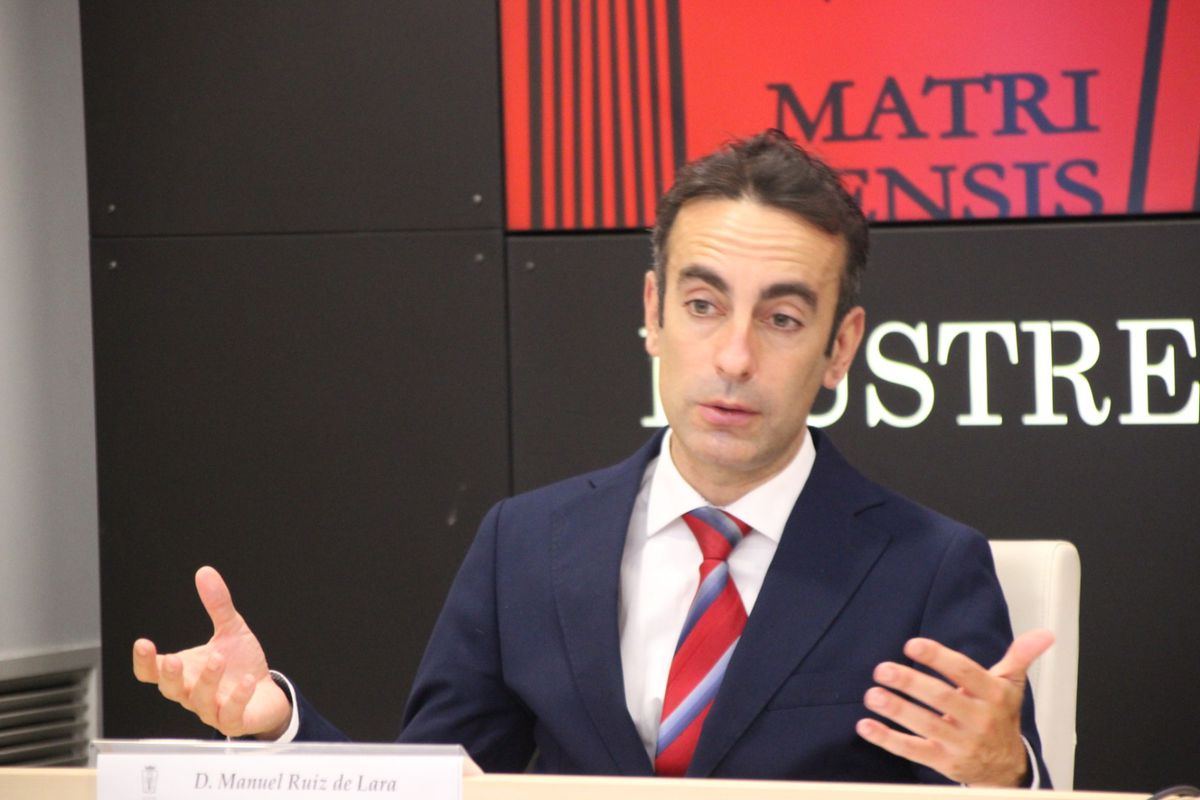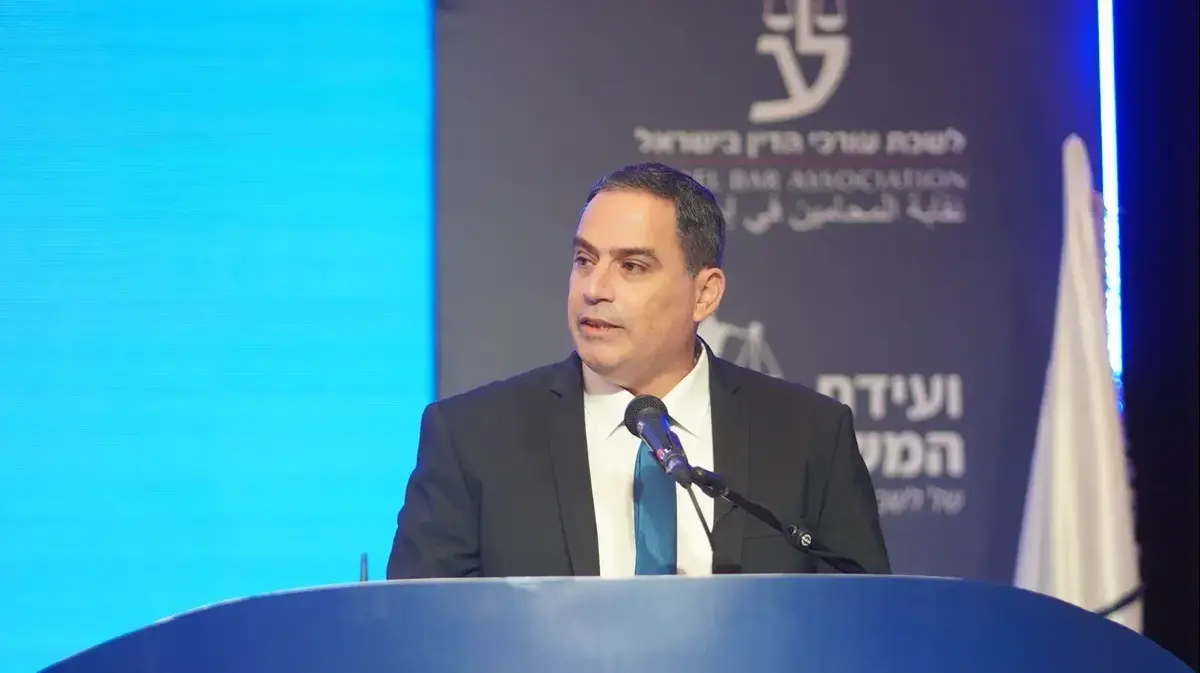He was the most voted prosecutor of the entire race for the Fiscal Council in 2018 (956 votes out of 2,850 possible) despite belonging to the Progressive Union of Prosecutors, a minority association.
Dolores Delgado, the former attorney general, appointed him head of the General Technical Secretariat, and recommended his promotion.
Álvaro García Ortiz (Lumbrales, Salamanca, 54 years old) now reaches the top of the tax career with extensive experience in environmental issues.
In his role as accuser in the trial for the sinking of the
Prestige
oil tanker , García Ortiz exonerated the PP government, which earned him criticism from a part of the left.
Now, the right accuses him of the opposite.
Ask.
You defend that the instruction passes from the judges to the prosecutors, but the Government has put that legal reform in a drawer.
Does it disappoint you?
Response.
I am not aware that the Government has put the draft in any drawer.
We prosecutors have been waiting for 40 years for a new Criminal Procedure Law that will give us the investigation, that will put us on a par with Europe and that will avoid this anomaly that we have with respect to other countries... What I know is that the General Council of the Judiciary has not yet made its report.
The Prosecutor's Office did it more than a year ago.
And without these procedures it is difficult for the law to go to Parliament...
P.
Do you have an opinion as attorney general on the situation in which the General Council of the Judiciary finds itself?
R.
It is unsustainable.
A State institution that has been on extension for four years is an absolutely abnormal situation.
I believe that what is happening is a breach of an institutional obligation.
[About the CGPJ] A state institution that has been on extension for four years is an absolutely abnormal situation.
Q.
Who defaults?
R.
Those who do not negotiate are in breach, those who have initiated a procedure four years ago that have been underway but are not being complied with.
The president of the General Council of the Judicial Power and of the Supreme Court issued a decree, sent it to the chambers with the election of 51 judges previously selected by the other judges [so that the 12 members could be elected].
The responsibility of someone who, negotiating a name, does not reach an agreement is not the same as that of someone who does not want to sit down to negotiate.
P.
The EU Commissioner for Justice, Didier Reynders, has visited the political and judicial power in Spain this week to try to renew the Council of the Judicial Power and change the election system of the 12 vocal judges.
What do you think of this attempt by the commissioner to impose a different model of the Judiciary?
R.
The word imposition is a very strong word.
The European Commissioner does not have the capacity, just as no Executive does.
We have some laws, which are made through Parliament.
A European institution cannot impose standards that exist for some European countries and not for others.
Not all countries have a General Council of the Judiciary, nor do they all have the same powers as ours.
What I have very clear is that justice does not belong to the judges;
justice belongs to all of us, it emanates from the people and, therefore, some simplification regarding the fact that judges elect judges is nothing more than limiting a situation that does not correspond to reality.
If we want to change the model, it can be changed, it can be discussed, it is taken to Parliament, which is the place where we have to discuss what model we want.
Y,
on that basis, draw conclusions.
But that phrase that judges choose judges is perhaps a bit flat.
Why only the judges?
If justice is all of us and prosecutors are incardinated in the Judiciary, because we are constitutionally there..., why can't prosecutors elect the General Council of the Judiciary?
If what the Council does affects all citizens because it says which judge you should go to, what happens with the guards, what happens with the accusations, why can't citizens also participate in that organization?
In that Judicial Power that, we must not forget, does not emanate from the judges, it emanates from the people like all the powers of the State.
Why only the judges?
If justice is all of us and prosecutors are incardinated in the Judiciary, because we are constitutionally there..., why can't prosecutors elect the General Council of the Judiciary?
If what the Council does affects all citizens because it says which judge you should go to, what happens with the guards, what happens with the accusations, why can't citizens also participate in that organization?
In that Judicial Power that, we must not forget, does not emanate from the judges, it emanates from the people like all the powers of the State.
Why only the judges?
If justice is all of us and prosecutors are incardinated in the Judiciary, because we are constitutionally there..., why can't prosecutors elect the General Council of the Judiciary?
If what the Council does affects all citizens because it says which judge you should go to, what happens with the guards, what happens with the accusations, why can't citizens also participate in that organization?
In that Judicial Power that, we must not forget, does not emanate from the judges, it emanates from the people like all the powers of the State.
what happens with the guards, what happens with the accusations, why can't citizens also participate in that organization?
In that Judicial Power that, we must not forget, does not emanate from the judges, it emanates from the people like all the powers of the State.
what happens with the guards, what happens with the accusations, why can't citizens also participate in that organization?
In that Judicial Power that, we must not forget, does not emanate from the judges, it emanates from the people like all the powers of the State.
Álvaro García Ortiz, State Attorney General, this Thursday at the Prosecutor's Office, in Madrid.Luis Sevillano
Q.
Do you consider the current model reasonable?
A.
The model has been in force since the 1985 modification of the Organic Law of the Judiciary.
It has passed through the Constitutional filter and has been ruling us all these years.
I have no legal doubts.
Doubts of another type?
Those that any citizen or any jurist may have: that it is a system, like all others, that can be improved, but of course legally and constitutionally impeccable, accommodated to the text of our Magna Carta.
P.
Before taking office as attorney general, some media such as the
Abc
newspaper or the Cope chain received you with some gross accusations.
Abc
reported that he had met in a hotel with the owner of an Andorran bank that is in dispute with the Government of Mariano Rajoy.
And Cope accused him of acting against the Executive of the PP in the
Prestige case,
where he intervened as a prosecutor.
It was all a lie.
How do you combat that?
R.
In the case of the cover of
Abc
, it has been placed in the hands of the State Attorney;
and in other cases I think that what needs to be done is an appeal to all of society, not just the media.
So that?
So that we are all aware that we have to preserve democratic institutions.
If the attack is against democratic institutions, we are going to destroy this democracy and we are going to destroy coexistence.
It is up to those of us who have the responsibility right now to remain calm, to be sensible, but of course to preserve our institutions as firmly as possible.
All those hoaxes, all those lies that sometimes travel through the network or you see on the front pages of some media, the only thing they do is undermine our institutions, and it is very dangerous.
The promotion of Dolores Delgado is not a prize, it is a merit
P.
Is it understandable that the Prosecutor's Office defends the conviction of the former Andalusian president José Antonio Griñán with the argument that he had to know about the fraud in the aid of the ERE that was granted by another council other than his and, in the meantime, ask for the file of the case against former Madrid president Esperanza Aguirre, who presided over three bodies where the Prosecutor's Office itself has found corruption but understands that the former leader of the PP did not know him?
A.
No two cases are the same.
It would be necessary to enter each of the procedures to give an explanation about which is one and which is the other.
An interview does not lead to it.
But much less for the attorney general to become a commentator.
Q.
What will the Prosecutor's Office report on Griñán's pardon?
R.
When we have it on the table, when we analyze what is coming and how it comes, a decision will be made.
There is no a
priori
in any case.
A decision will be made in the Prosecutor's Office, which will normally be made by the prosecutors who have participated and have been a party to that case.
P.
The Prosecutor's Office filed the three open investigations into Juan Carlos I, after an analysis in which seven prosecutors participated, including yourself, where there were doubts as to whether the inviolability of the King included in the Constitution protected him in his private acts.
I do not know if now, as state attorney general, he is capable of issuing an opinion as to whether or not inviolability protects a monarch in his private acts.
R.
I want to clarify how the decision process takes place in the matter of the king emeritus.
The Prosecutor's Office, and it must be valued, did an extraordinary investigative job and also reflected on what the result of that investigation was.
It was put on paper and delivered to public opinion.
In other words, all Spaniards had access to know what had happened and what the legal opinion of the Prosecutor's Office was.
In that case, always subject to the existing legal framework, let's not forget: to the existing legal framework.
From there, each one can have his opinion within the Prosecutor's Office itself, being the direction of the investigation first of the prosecutor Juan Ignacio Campos and after Alejandro Luzón.
The most natural thing is that there are debates of a legal nature and we consider absolutely everything, because the prosecutor, the jurist,
it must fill in all those gaps in legal reasoning that are necessary to arrive at the best possible legal solution.
And I think that's what was done.
Our legal framework, our juridical framework, is what can be debated today, whether we should change it or not.
But I believe that the Prosecutor's Office has already expressed its opinion in that case.
No prosecutor in this country is opposed to having filters to be attorney general
P.
If a king of Spain killed his gardener, could he be judged?
R.
The debate on the inviolability of private acts of the King must be put on the table without any doubt.
But I stick with the decision made by the Prosecutor's Office at the time.
I don't want to move from there.
I understand that it is a healthy debate and that in a democracy all debates can be raised.
And it is a debate that Spanish society must resolve, but we must resolve it.
P.
Should it be prohibited by law that someone who has been a deputy or a position in the government party can be the attorney general?
R.
We should reflect on that.
And if we come to the conclusion that it is good that these filters exist, the legislator introduces them into the law and the prosecutor or attorney general of the State that is elected by the Executive must meet those requirements.
It is also important to know that there is no single model of attorney general in the world.
In some places, he is the Minister of Justice himself and, in others, he has absolute links with the Executive.
Therefore, since there is no model, we will have to adapt our society and what we are to the Prosecutor's Office that we want.
We cannot let ourselves be guided by the here and now, but let's make that reflection.
I don't think any prosecutor in this country is opposed to having filters for access to the State Attorney General's Office.
Q.
Why did you decide to reward former Attorney General Dolores Delgado for the Head of the Military Prosecutor's Office in the Supreme Court, despite the fact that she had more votes against than in favor?
R.
The word reward already carries a burden on the decision made.
In the first place, it must be said that Dolores Delgado's curriculum as a prosecutor, without any doubt, is the best curriculum to access the position.
That's the budget.
Second, the Fiscal Council is a reporting advisory body.
If the state attorney general had to always follow the indications of the majority of the Fiscal Council, with a majority of an association, discretionary positions would always be appointed at the discretion of that association.
The discretion of the State Attorney General would not exist and the Fiscal Council would make the appointments.
That is not the model.
It is not the model that the legislator has intended, nor is it our constitutional model.
In any case, having the best resume as a prosecutor,
The commissioner has no power to impose a different model of election
Q.
After resigning from the Attorney General's Office for health reasons, don't you think that Dolores Delgado did it to guarantee herself this position in the Supreme Court, given that if she continued in office and the PP came to power, she would never would you access that place?
R.
Whoever says that is denying the evidence of a serious illness that the former attorney general has.
Little more needs to be said.
This is another one of those hoaxes that we must fight.
P.
They accuse you of maneuvering to prevent prosecutor Ignacio Stampa from winning a position in Anticorruption to continue leading the investigation of the
Villarejo case,
delaying the conclusion of a file that ended with Stampa's exoneration.
Do you regret something?
R.
Everyone has been able to see my participation and has been able to comment on it.
I believe that any shadow of doubt about what happened there is cleared up by seeing the final result, which is very simple.
The attribution of certain behaviors is determined by rewarding or punishing a person's behavior in relation to a specific case.
And the end result is that the Prosecutor's Office asks no less than 80 years in prison for that supposedly favored person [commissioner Villarejo].
That is the reality of the facts.
Everything that has happened before is a construction on facts whose final result is absolutely unappealable.
Q.
Why do you put the prosecutor Manuel Moix, who resigned in 2017 as head of Anticorruption after learning of his company in a tax haven, at the head of the Disciplinary Action?
R.
Two courtroom prosecutors showed up to the square and, among them, without a doubt due to their accredited training in contentious-administrative [jurisdiction] and experience in the Madrid headquarters, it was the most appropriate profile.
In addition, he is not associated, which means clearing up any appearance of bias in a position as unique as this.
Subscribe to continue reading
read without limits
Keep reading
I'm already a subscriber




/cloudfront-eu-central-1.images.arcpublishing.com/prisa/RYAE4R2YX5G7LGEJQ74SXZI47A.jpg)
/cloudfront-eu-central-1.images.arcpublishing.com/prisa/4EXOEQQAWNH53ICZAJC5SNVJAE.jpg)








